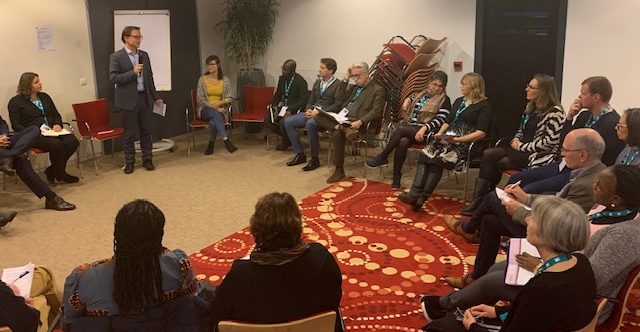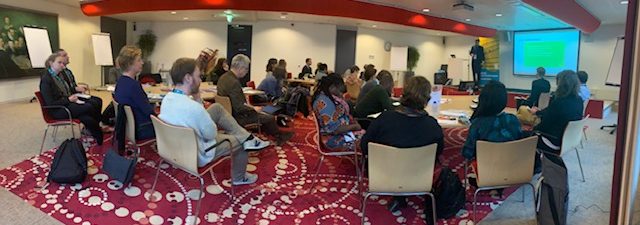Practitioners, researchers and policy makers are well aware of the contribution of research in adapting and developing policies and interventions. But for using research in decision-making, insights should be known, accessible and trusted. Here, the role of knowledge brokering is essential. An exchange meeting on 6 December 2019 of the Science for Using Research (SURe) programme was organised by NWO-WOTRO Science for Global Development to discuss insights from scientific research on this matter and to find out what (potentially) works in brokering knowledge to enhance the outcomes and potential impact of research for inclusive global development.

The status quo of knowledge brokering in science 1
While we know much about knowledge brokering in science, our understanding and evidence in this field is rather fragmented. Key terminology is flexibly applied and contested, and cross-sectoral knowledge on research use is lacking. Traditionally, research use and knowledge brokering has been seen as a linear and rational process of moving from knowing (knowledge creation and validation) to doing (dissemination and adoption). However, this is often criticised as being an simplistic image as the process is not always rational and unidirectional.
In response to such criticisms, knowledge-to-action thinking (as explained by Best & Holmes 2) has evolved through three generations. The linear thinking of knowledge transfer (generation one) is no longer the dominant model. Instead there is an emphasis on knowledge exchange (generation two) where the focus is on sharing and discussing different sources of knowledge (e.g. from research, policy and practice). Whether knowledge is used is no longer viewed as being dependent on the effective packaging and dissemination of generalisable knowledge but on the effectiveness of relationships and social interactions to build and develop situated knowledge. More recently, a knowledge integration approach (generation three) has been advocated. Here knowledge is considered to be embedded in systems and cultures that are interdependent, complex and adaptive. Hence changes in one part of a system can lead to unexpected/unintended changes in other parts of a system. The degree of research use in this approach depends on effective integration with organisations and systems.
Although knowledge-to-action thinking has shifted, much knowledge brokering practice still revolves around knowledge transfer and therefore a strong emphasis remains on pushing/disseminating research to policy makers and practitioners. Knowledge brokering practice focuses much less on changing systems and cultures to increase the demand for research. For example, public spending bids to be supported by research evidence. It is important to move from short to longer term commitments, and from an outside-in to an inside-out approach.
Knowledge (brokering) contributions of the SURe programme
The SURe programme consists of three research projects, made up of teams of researchers from low and middle income countries as well as of The Netherlands with postdoctoral researchers in the lead.
They investigate the following aspects of knowledge brokering:
- Contextual factors and institutional dynamics that affect learning in innovation platforms (putting heads together);
- The role of specific actors in brokering knowledge for international development, particularly the private/for-profit sector (An unusual suspect);
- Improvement, institutionalisation and the contribution of knowledge-to-use strategies to development, notably for better sexual and reproductive health (translating evidence into better sexual and reproductive health).
The first outcomes
The first outcomes of the three projects are quite innovative and seemingly impactful at a local level, these are the key insights:
Putting heads together:
- There is strong evidence that knowledge brokering and co-creation in multi-stakeholder platforms have positive results in terms of increased yields and income for farmers, policy changes, and more sustainable agricultural practices;
- There is less evidence that these platforms are the most effective way to address key challenges related to sustainable and inclusive development and improve agricultural practices. Moreover, most platforms are donor-driven and the sustainability of initiatives or results is a key challenge;
- Farmer-centered learning platforms stimulate knowledge exchange close to farmers’ life-world. This fosters peer-to-peer learning and learning between different actors. Moreover, research results can be communicated to farmers and practitioners shortly after they have been collected.
An Unusual suspect:
- There is considerable distrust of the private sector by the public sector and vice versa, therefore opportunities for face-to-face contact and interaction are important to remove barriers to collaboration. Such spaces for interaction and collaboration (funding instruments or physical meetings) need to reflect the private sectors’ priorities (e.g. scaling up and risk reduction);
- Development policy is very much targeted at encouraging cooperation with the private sector in knowledge brokering and other activities, however trade-offs involved in working with the private sector, based on the development and sustainability relevance of specific actors, are important to consider. In the identification of new partners, benchmarking exercises and standards can be useful in identifying private sector partners that share common perspectives and practices;
- The private sector is extremely complex, ranging from small informal enterprises in the Global South to multinational enterprises. Although contributors to knowledge brokering in international development tend to be formal enterprises, this diversity has considerable implications for the analysis of their current and potential roles.
Translating evidence into better sexual and reproductive health:
- Research findings need to be contextualized before they can contribute to policy and practice, which can be supported by deliberative dialogues 3. This work is generally not acknowledged by knowledge producers and users;
- The contribution mapping approach allows for mapping of the actual and concrete contributions that research makes to policy and practice, moving away from generic ‘impact’ notions;
- Through responsive knowledge translation, existing methods for knowledge translation with a responsive pragmatic approach are combined. One constantly seeks what works best, for whom, and in which specific situation. That includes shifting between looking backward and forward in order to understand how knowledge contributes to certain practices.
All SURe projects have contributed key messages on knowledge brokering in science. However, sustainability and scalability remain a challenge for each project. The necessary resources for the pilot projects required an enormous commitment, not only for the people directly involved, but also for the stakeholders. We should be aware of this when designing next steps.
A future for SURe?
During a potential next phase of SURe there are several aspect of knowledge brokering in science that require further investigation:
- Addressing challenges around scaling up and the sustainability of pilot projects;
- Deeper understanding of the complex systems that support research use leading to structural changes;
- Better understanding of what knowledge brokers’ assume is needed and what is actually needed;
- More attention for cross-disciplinary and cross-sector learning;
- Exploring alternative ways of research uptake and use (e.g. add-ons such as drama).

Footnotes
- Based on the presentation of Emeritus Professor Sandra Nutley during the SURe exchange meeting
- Best, A., & Holmes, B. (2010). Systems thinking, knowledge and action: towards better models and methods. Evidence & Policy: A Journal of Research, Debate and Practice, 6(2), 145-159.
- A process whereby research evidence is considered accompanied by views, experiences and tacit knowledge of those involved and or affected by future decisions about high priority issues.
Lavis, J. N., Boyko, J. A., Oxman, A. D., Lewin, S., & Fretheim, A. (2009). SUPPORT Tools for evidence-informed health Policymaking (STP) 14: Organising and using policy dialogues to support evidence-informed policymaking. Health Research Policy and Systems, 7(1), S14.
